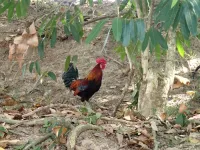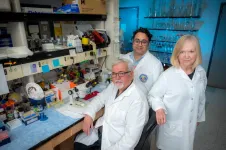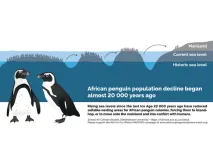(Press-News.org) Homeowners should be rewarded to garden sustainably, new research by Professor of Environmental Horticulture at University of Sheffield, recommends
Rewards for sustainable gardening could include reductions to council tax, water bills or assistance with resources
Ensuring urban gardeners have the ability to have planted gardens will have numerous benefits for the environment and communities
Banning environmentally damaging materials, such as pesticides; or practices such as installing astroturf, could also benefit the environment
Research shows that some cities may have lost as much as 50 per cent of their green garden space over the last two decades, contributing to rising urban temperatures
Homeowners should be rewarded to garden sustainably, to help combat the damaging effects of climate change in cities and promote a healthier urban landscape.
According to new research from the University of Sheffield, policymakers should offer incentives, such as council tax or water bill discounts, to encourage gardeners to use environmentally sensitive techniques to help combat climate change in cities and boost communities' health and wellbeing.
The new study, published by Professor Ross Cameron in Urban Forestry and Urban Greening, highlights that, as gardens become increasingly important in the battle against the extreme effects of climate change, financial incentives should be considered to ensure gardens are well stocked with plants.
Professor Cameron said: “Gardens account for a third of all our urban areas and are vital spaces in terms of keeping our buildings and city environments cool in summer, absorbing rain to avoid flash flooding and providing an important refuge for wildlife.
“Gardens need to be green and full of plants to be beneficial to the local environment, and some types of garden are more beneficial than others.”
“The paradox is that many gardens are not actually green and some trends in garden design can be very damaging for the urban environment. We have paved them over to house the car, or provide sterile patio space; factors that increase urban temperatures and increase flooding risk.”
The study calls for policy-makers to promote more sustainable garden management and to help foster gardening activities that help us meet important environmental and sustainability targets.
Professor Cameron outlines potential incentives that could be offered by policymakers to ensure gardens remain green and well-planted, including:
Offering financial rewards – such as a reduction in council tax or water bills – for house owners with more than 50 per cent of their garden space planted
Offering financial incentives to plant or maintain trees in gardens, with appropriate choices based on size of garden
Banning or restricting features that damage environmental processes e.g. having a maximum area artificial grass can cover and banning synthetic pesticides for home garden use
Acknowledging that gardens with a high proportion of plants act as a health facility, and that planning processes should have mandatory requirements to include and protect, well-planted areas
Will Teare, 32, from Norton Lees, and his family have been planting a garden that provides a home for wildlife as well as a space for them to enjoy at the same time.
He said: “When we moved into our house, we thought about how we could create a garden that would help us be more connected to nature, so the most important thing for us has been that it benefits wildlife.
“Humans are responsible for a lot of the loss of habitat for wildlife and we wanted to invite it back into the garden. Everything we try in the garden, whether it is the plants we use, or having a go at creating different habitats in the garden, say with a woodland type area or pond, needs to have value for the wildlife.
“The family gets a lot of enjoyment out of it, the birds coming to nest, or watching the frogs and newts around the pond; it brings the garden to life, and is a source of excitement for the kids.”
“I think like us, everyone can work with what space they have, have a small tree, unusual plants, or create different habitats; basically anything other than hard paving can be an asset to wildlife, and benefits us as well. So I think incentives to plant a garden will definitely get people to think about it!”
Unlike previous eras, where private garden management has largely been left to the discretion of the homeowner, Professor Cameron argues that radical changes in policy and practice are now required if local authorities are to deal effectively with the impacts of climate change and biodiversity loss at a city level.
He said: “Our research shows that some cities may have lost as much as 50 per cent of their ‘green’ garden space over the last two decades. Many residents use artificial grass that kills much of the soil life underneath it, and when real plants are present, we wrongly assume we need to hit them with a cocktail of chemicals to keep them alive and free of pests. These chemicals pollute our watercourses and damage the ecological function of our gardens”.
The research suggests well-planted gardens not only provide a quality habitat for wildlife, but also improves local air quality, improves health and well-being, provides people with the opportunity to grow their own food, connect with nature and reduce energy bills by better insulating homes.
Professor Helen Woolley, Head of the Department of Landscape Architecture at the University of Sheffield, said: “The value of this research is it categorically states the value of a particular landscape type and how that links to different socio-environmental agendas. Many citizens quickly realised the value of their home gardens during the pandemic lockdowns, and this academic paper builds on and reinforces what we learned then. It is important that policy makers and planners take note.”
Professor Ross Cameron is also the author of a new book exploring the science behind how introducing plants into your life and space, irrespective of how much outdoor space you actually have, can promote a powerful, long-lasting and positive impact on your well-being.
‘How plants can save your life’ will be published by Quercus on 25 May 2023.
ENDS
Media contact: Rebecca Ferguson, Media & PR Officer, 0114 222 3670, r.l.ferguson@sheffield.ac.uk
Notes to editors:
Read the full study at ScienceDirect: https://www.sciencedirect.com/science/article/pii/S1618866722003636?via%3Dihub
Image asset available for ‘How plants can save your life’, please contact the Media & PR Officer END
Cut council tax for green gardeners to help cities tackle climate change
2023-04-20
ELSE PRESS RELEASES FROM THIS DATE:
Online tool found to be effective at assessing dementia risk
2023-04-20
Researchers at UNSW Sydney and Neuroscience Research Australia (NeuRA) have developed and evaluated a tool for assessing dementia risk, with promising initial results.
Currently, over 55 million people are living with dementia around the world, with that number set to increase to 78 million by 2030, and the focus on dementia research increasingly shifting towards prevention.
The online tool takes approximately 20 minutes to complete and provides a personalised dementia risk report that patients can discuss with their doctor.
Since developing the risk tool – known as CogDRisk – in 2022, the team has been evaluating the success of the tool, by trialling it on four existing datasets, ...
A myth no more: Cranberry products can prevent urinary tract infections for women
2023-04-20
Drinking cranberry juice has long been a mythical prevention strategy for women who develop a urinary tract infection – and new medical evidence shows consuming cranberry products is an effective way to prevent a UTI before it gets started.
A global study looking at the benefits of cranberry products published in Cochrane Reviews has determined cranberry juice, and its supplements, reduce the risk of repeat symptomatic UTIs in women by more than a quarter, in children by more than half, and in people susceptible to UTI following medical interventions by about ...
Recycling lake sediments for crop production: A sustainable solution for closing the phosphorus cycle
2023-04-20
A four-year field experiment conducted on the shores of restored Lake Mustijärv in Viljandi, Estonia, has revealed that recycling phosphorus-rich lake sediments back to agriculture could have positive impacts on crop production.
The study was conducted by doctoral researcher Mina Kiani and the AgriChar research group, and it is globally the first of its kind to cover the environmental aspects of recycling lake sediments to agriculture over several years. Kiani defends her thesis on 21 April at the University of Helsinki Faculty of Agriculture and Forestry.
The study aimed to find a sustainable solution for closing the leaking agricultural phosphorus (P) cycle by recycling P-rich ...
Chicken breeding in Japan dates back to fourth century BCE
2023-04-20
Conclusive evidence of chicken breeding in the Yayoi period of Japan has been discovered from the Karako-Kagi site.
The chicken is one of the most common domesticated animals, with a current estimated population of over 33 billion individuals. They are reared for their meat and eggs, and may be kept as pets.
The chicken is believed to have been domesticated in Southeast Asia about 3500 years ago, following which they were carried to all corners of the world. The exact date of introduction of chicken breeding to Japan is under debate, as there are no historical records and archeological evidence ...
Protecting the vision of premature babies
2023-04-20
AUGUSTA, Ga. (April 20, 2023) – In the spiraling cycle that can lead to vision loss in premature newborns, Medical College of Georgia scientists have found a new target and drug that together appear to stop the destruction in its tracks.
In babies, the development of the blood vessels of the retina should be complete by birth. But with preterm birth, the still-immature retina can develop a potentially blinding eye disorder known as retinopathy of prematurity.
When premature babies transition from inside the womb, where ...
African penguins: climate refugees from a distant past?
2023-04-20
Imagine the view from the western coastline of southern Africa during the Last Glacial Maximum (LGM) over twenty thousand years ago: in the distance you would see at least fifteen large islands – the largest 300 square kilometres in area – swarming with hundreds of millions of marine birds and penguin colonies.
Now imagine sea levels rising up to a hundred metres between fifteen to seven thousand years ago, gradually covering these large islands until only small hill tops and outcrops remained above water. Over the past 22 000 years this resulted in a tenfold ...
New study challenges the idea that early Parkinson’s Disease causes cognitive dysfunction
2023-04-19
Like many neurodegenerative diseases, Parkinson’s disease (PD) is a thief that hacks into human operating systems and corrupts their cognitive hard drives until they can no longer control their movements or perform activities of daily living.
Often, in its later stages, Parkinson’s disease steals data too, leading to memory loss, confusion and dementia.
Both the cause and cure of Parkinson’s disease remain elusive, but research has helped afflicted individuals manage their symptoms and lead healthier post-diagnosis lives. Individuals diagnosed with Parkinson’s ...
Fighting a national nursing faculty shortage
2023-04-19
Last year, nursing schools across the country were forced to turn away more than 90,000 qualified applicants. The reason: a lack of faculty members to teach them and clinical sites to train them.
A team of University of Texas at Arlington faculty led by Ann Eckhardt, clinical associate professor and interim chair of graduate nursing programs in the College of Nursing and Health Innovation (CONHI), received a state grant to help reverse that trend and increase the pool of nursing faculty, preceptors and simulation coordinators.
“There ...
Clinical trial begins using CAR T cells to potentially cure HIV
2023-04-19
UC Davis Health researchers have dosed the second participant in their clinical trial looking to identify a potential cure for HIV utilizing CAR T-cell therapy. The novel study uses immunotherapy. It involves taking a patient's own white blood cells, called T-cells, and modifying them so they can identify and target HIV cells to control the virus without medication.
The first participant was dosed with anti-HIV duoCAR T cells at UC Davis Medical Center in mid-August. The trial is the first-in-human clinical study investigating the duoCAR T-cell therapy for the treatment of HIV.
“We have reached ...
Older adults may achieve same cognition as undergrads
2023-04-19
A set of recent studies demonstrates for the first time that learning multiple new tasks carries benefits for cognition long after the learning has been completed.
The finding affirms a long-held assertion of the lead researcher, Rachel Wu, who is an associate professor of psychology at UC Riverside. That is, older adults can learn new tasks and improve their cognition in the process, if they approach learning as a child does.
“Our findings provide evidence that simultaneously learning real-world skills can lead to long-term improvements in cognition during older adulthood,” ...




